Key takeaways:
- Reparations encompass various forms, such as financial compensation and public apologies, and require a deep understanding of historical context to address systemic inequalities.
- Key arguments in the reparations debate emphasize ethical responsibility, economic disparities, and the potential for societal healing through open dialogue.
- Case studies like the reparations for Japanese Americans and Holocaust survivors highlight the significance of acknowledging past injustices and their ongoing impacts.
- Advocacy efforts should focus on grassroots collaboration, education, and the use of social media to amplify discussions around reparative justice.
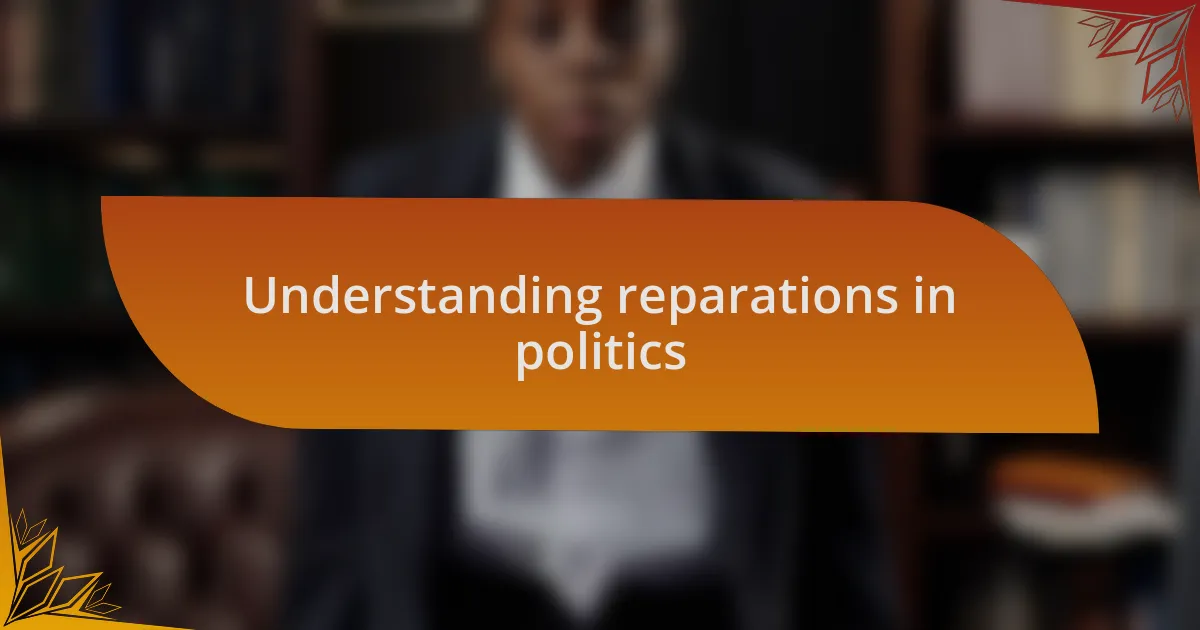
Understanding reparations in politics
Reparations in politics is not just a theoretical debate; it’s a deeply personal issue that evokes strong emotions for many. Reflecting on my own experiences, I’ve felt the weight of historical injustices in conversations with friends and family. When we consider reparations, we must ask ourselves: what does justice look like for communities that have faced systemic discrimination for generations?
Understanding reparations also calls for recognizing the complexities involved, as they can take various forms, such as financial compensation, land restitution, or even public apologies. I recall a powerful conversation I had at a community forum where someone asked, “Is it enough to say sorry, or do we need to take tangible steps?” This question highlights how reparative justice must translate into practical measures that resonate with people’s lived experiences.
At its core, reparations challenge us to confront uncomfortable truths about our past and acknowledge the realities of systemic inequality. I often think about how history is not just a series of events; it’s a narrative that shapes our identities today. Engaging with reparations in politics is about reimagining that narrative and exploring how we can reshape our collective future.
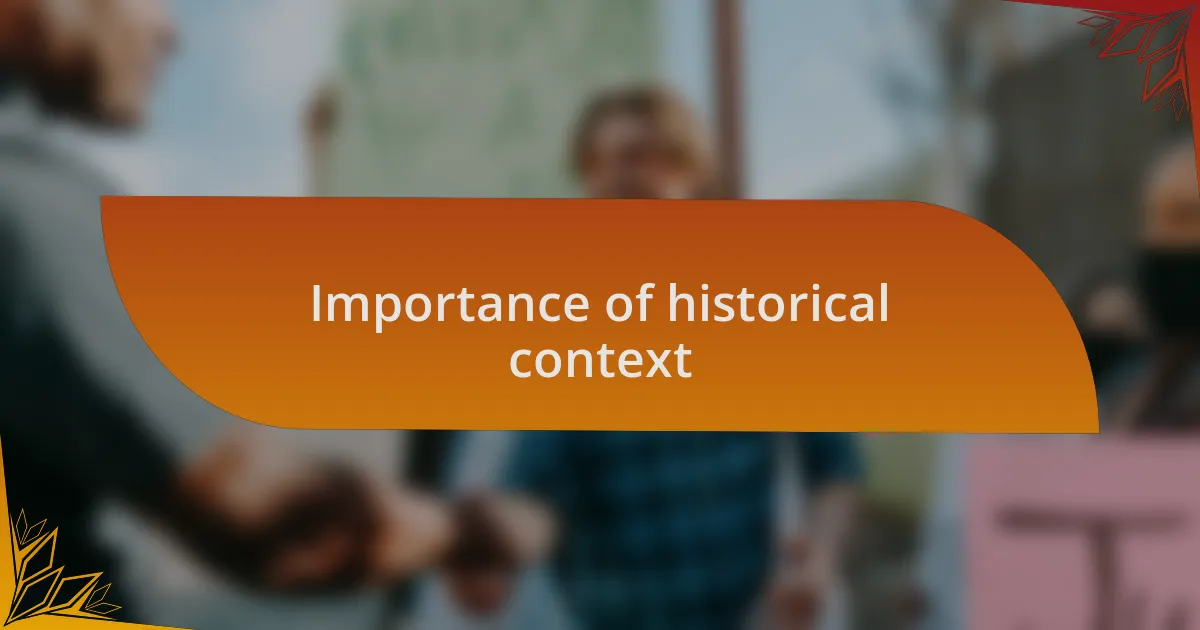
Importance of historical context
Understanding the importance of historical context in reparations debates is crucial. When I look back at my own family’s history, I see how the repercussions of past injustices resonate through generations. This acknowledgment of history sheds light on why reparations are not merely about monetary compensation; they serve as recognition of pain and loss.
Each historical moment carries its weight, shaping current societal dynamics. I remember a discussion I had about the legacy of colonialism and how it affects marginalized communities today. It made me realize that without examining the context of these wrongs, we risk repeating patterns of exclusion and neglect. How can we foster healing without understanding the wounds that need mending?
By grounding our conversations in historical facts, we invite a more profound understanding of the results of systemic oppression. I often wonder, if we fail to heed history, can we ever adequately grasp the depth of struggle faced by those seeking justice? Reflecting on this, I believe that integrating historical context is indispensable in forging pathways towards reparative justice.
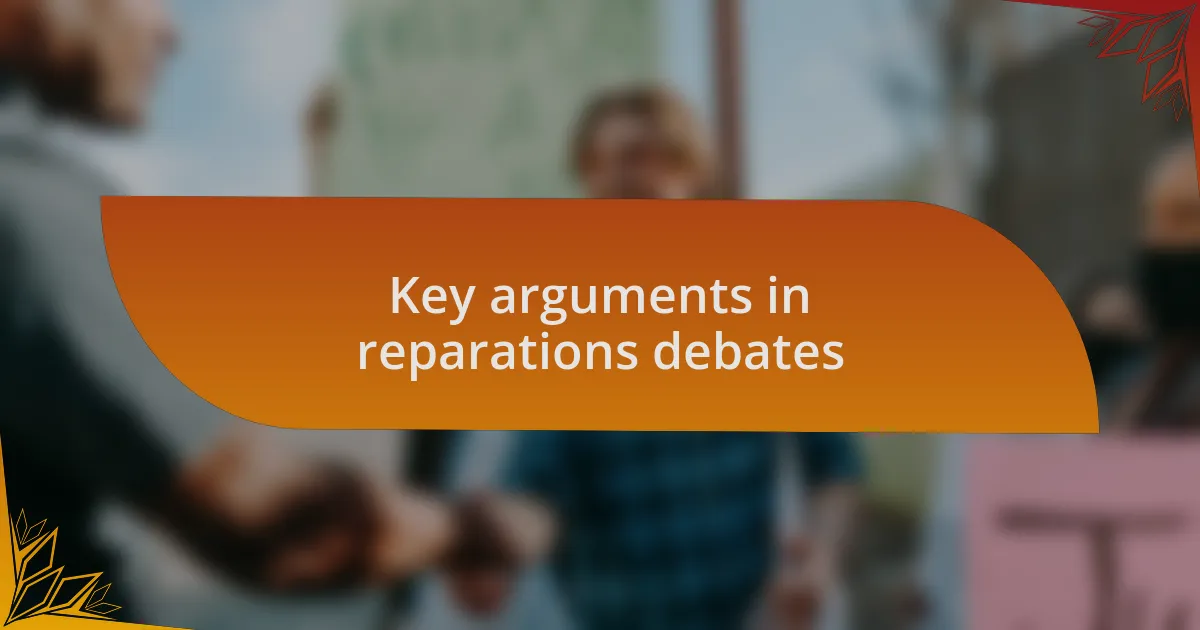
Key arguments in reparations debates
One of the core arguments in the reparations debate centers around ethical responsibility. I often hear people question, “Should we bear the burden of sins committed by ancestors?” My response comes from my reflections on collective accountability; just as we inherit cultural legacies, we also inherit a history of injustice that calls for rectification. It feels like a moral obligation to address these wrongs, not just for the sake of fairness, but for a more just society.
Another significant argument revolves around economic disparities. There’s clear evidence that systemic oppression has led to significant wealth gaps. I remember visiting a community where residents shared stories of their ancestors being denied property and education—decisions that have cascading impacts on wealth today. This brings to light the question: How can we ignore the economic legacy of past injustices if we want to build an equitable future? It seems that addressing these disparities through reparations could be a step toward dismantling these entrenched inequalities.
Additionally, the debate includes the perspective that reparations can foster healing. In my conversations about this topic, I’ve often asked myself, “What does it mean to heal as a society?” Many suggest that reparations could initiate meaningful dialogues about race and injustice, creating a collective space for acknowledgment and remorse. From my experience, embracing such conversations is crucial; they enable us to confront uncomfortable truths and ultimately forge a more united community, moving us closer toward reconciliation.
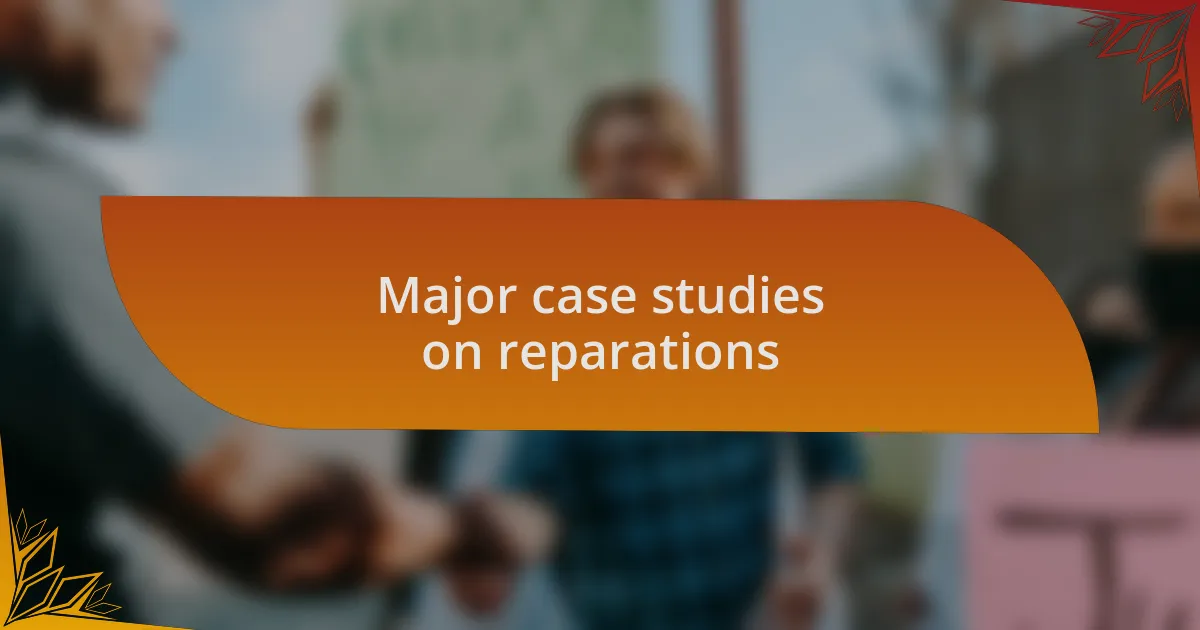
Major case studies on reparations
When examining major case studies on reparations, one cannot overlook the landmark decision made by the U.S. government to offer reparations to Japanese Americans interned during World War II. In the 1980s, I remember watching documentaries that detailed the forced relocation and imprisonment of entire families. The government eventually acknowledged this injustice through monetary compensation and a formal apology. It made me question: is it possible for society to similarly recognize other historical wrongs in a meaningful way?
Another compelling example is Germany’s reparations to Holocaust survivors, which began in the 1950s and continues to this day. As I learned about the ongoing financial support for survivors, it struck me how a nation grapples with its dark past. The emotional weight of this acknowledgment carries great significance; it evokes a sense of shared responsibility that resonates even beyond the affected communities. Could this model serve as a foundation to inspire other nations in addressing their histories of oppression?
Turning to South Africa, the Truth and Reconciliation Commission (TRC) offers an intriguing case where reparations were tied to restorative justice efforts aimed at healing a deeply divided society post-apartheid. Discussing the TRC with friends has often led me to reflect on what true reconciliation entails. The personal testimonies shared during those hearings offered powerful glimpses into the lived experiences of oppression. Can we take these lessons and apply them in our own contexts as we seek reparative justice today?
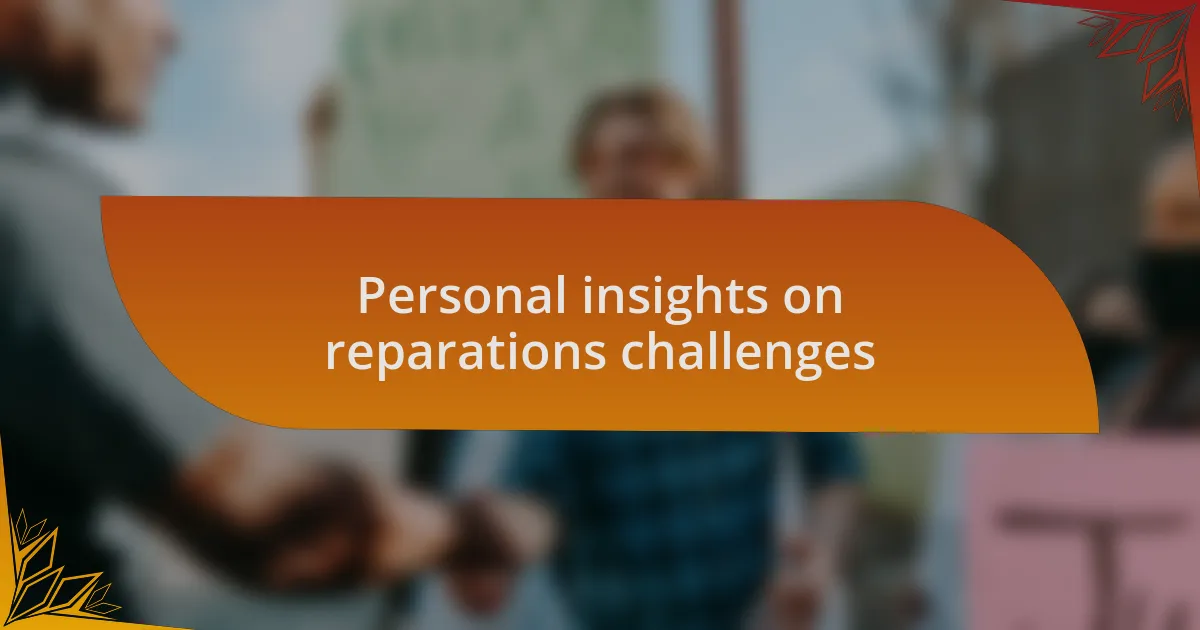
Personal insights on reparations challenges
While considering the challenges of reparations, I often think about the complexities involved in determining who should receive compensation. I remember a conversation with a friend who pointed out how difficult it is to draw clear lines of accountability in situations that span generations. How do we address grievances that touch on so many different individuals and communities?
Another challenge that resonates with me is the emotional weight surrounding the conversations on reparations. I can still recall attending a community forum where participants shared their stories; the depth of pain and anger was palpable. It made me realize that while financial compensation is significant, the acknowledgment of trauma and the act of listening are just as crucial for healing. How can we create spaces that honor these emotions while pushing for concrete action?
Navigating public opinion adds another layer of complexity. I recently engaged in a heated discussion on social media about the necessity of reparations. It was eye-opening to see how deeply divided opinions can be and how misinformation often fuels resistance. This led me to wonder: if we can’t reach a consensus on the moral obligation behind reparations, how can we hope to implement effective policies?
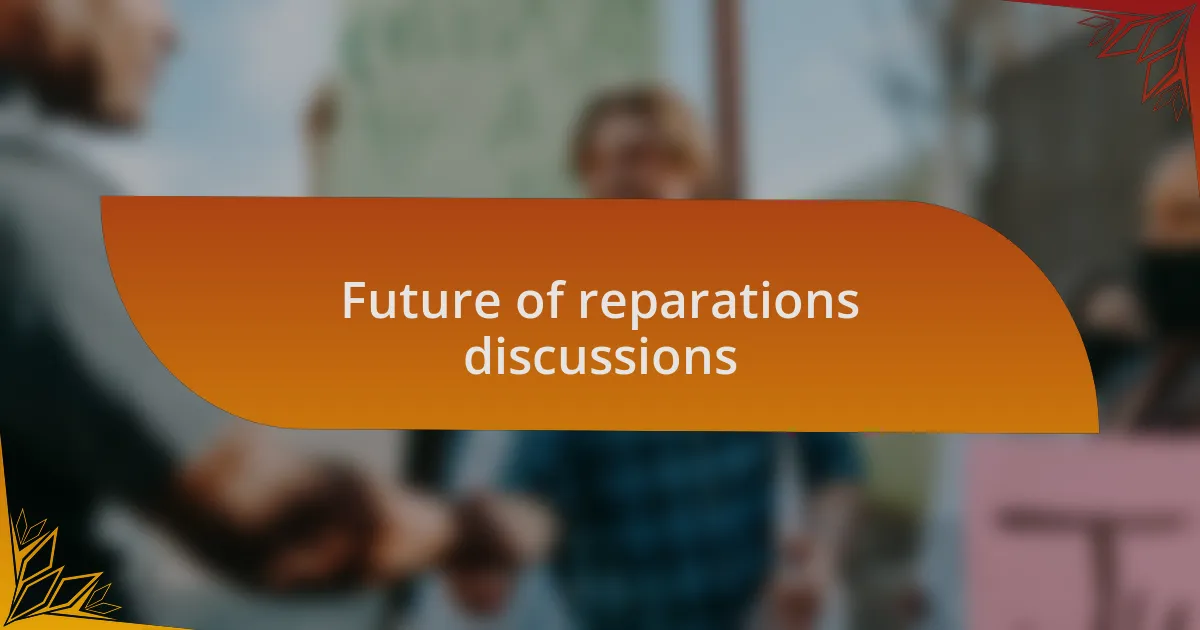
Future of reparations discussions
As I reflect on the future of reparations discussions, I see a potential for evolution in how we frame these conversations. I once participated in a workshop where community leaders brainstormed innovative approaches to reparations, emphasizing the need for education and empathy. This collaborative spirit made me hopeful that as more voices join the dialogue, we can start to see a broader understanding of the historical context and its ongoing impact.
One key aspect that I believe will shape future discussions is the integration of reparative justice into broader policy frameworks. I remember reading about cities that have begun to recognize the historical injustices tied to their development and are actively working to address them. It feels like a crucial shift towards not only addressing the past but also preventing future inequalities. How might this trend influence national conversations around reparations?
Moreover, the importance of storytelling cannot be understated. I had a profound experience when a mentor shared their family’s multi-generational narrative of hardship and resilience. This personal connection to the issue reminded me that reparations aren’t just about financial compensation—they’re about restoring dignity and acknowledging the human experience. So, how do we ensure that these stories are central to the discussions moving forward? Engaging the public in this way could be key to building the necessary support for meaningful reparations.
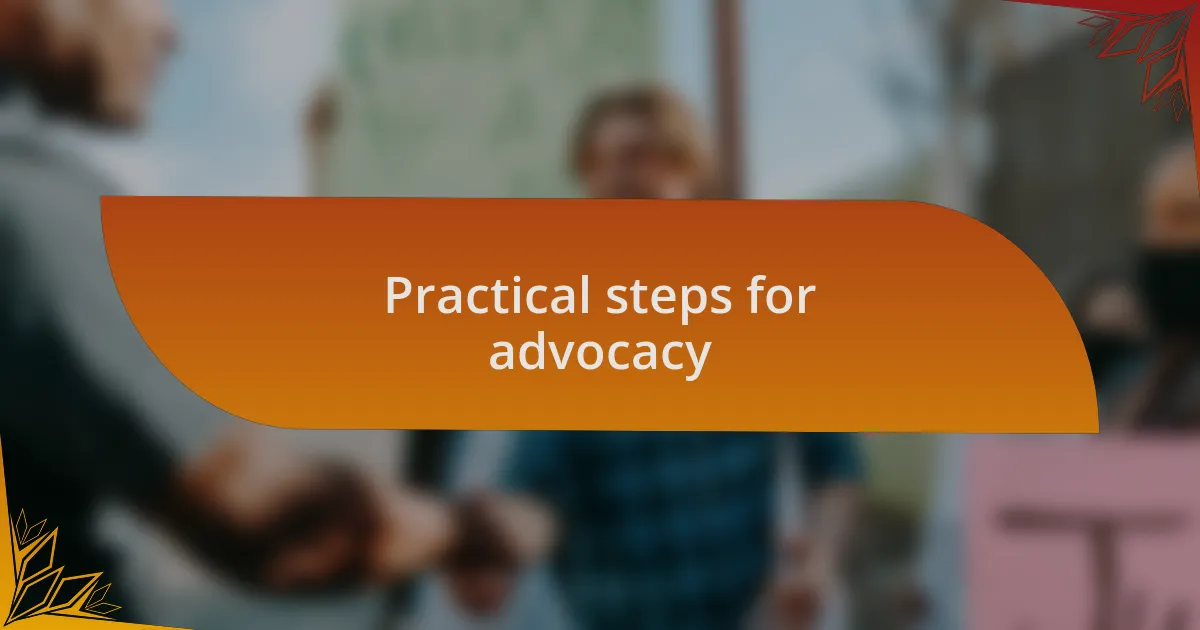
Practical steps for advocacy
Advocacy for reparations requires strategic grassroots efforts. I recall attending a local rally where passionate activists highlighted the importance of building coalitions across different communities. This reminded me that the strength of a movement lies in its ability to unite diverse voices, so why not explore avenues for collaboration with groups that may not immediately appear aligned?
One practical step is organizing educational workshops that facilitate open dialogue about reparative justice. I remember leading a session where participants shared their perspectives and listened to each other’s stories. It wasn’t merely about facts; it was about fostering empathy and understanding. This experience taught me that education can create a ripple effect, empowering individuals to advocate for change within their own networks. Could these intimate settings also encourage more people to take action?
Another important strategy is harnessing social media to amplify advocacy efforts. I often reflect on how a single tweet can spark nationwide discussions. By sharing personal stories and relevant research, advocates can reach audiences beyond their local communities. How often do we underestimate the power of digital storytelling in shaping public perception? This approach not only informs but also mobilizes support and invites broader participation in the reparations conversation.